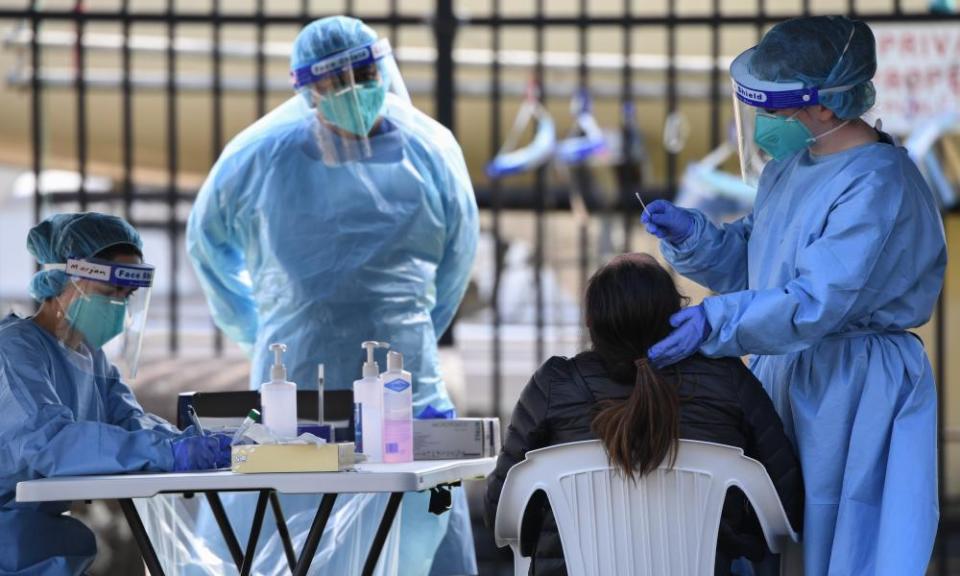Essential poll: Australians more worried about stopping Covid spread than reviving economy

Australians rank stopping community transmission of Covid-19 higher on their list of priorities than restarting the economy and putting it on the road to recovery, according to the latest Guardian Essential poll, which shows people are increasingly nervous about the second wave.
The latest survey of 1,010 respondents found 62% of the sample ranked stopping community transmission as their most important issue, compared with more than half of respondents who nominated either economic recovery (55%) or managing the economy (53%) as very important.
Priorities on the list varied by people’s voting intentions. Both Coalition and Labor voters (64%) want to stop community transmission, but Coalition voters rank economic management (68%) and recovery (64%) higher than Labor voters (52% and 55%).
Related: Aged care regulator took four days to tell Australian government of St Basil's Covid-19 outbreak
Reducing debt ranks much further down the list of priorities for all voters (34%) despite debt and deficit hitting record levels federally because of the fiscal support rolled out during the pandemic. But again, the results vary by voting intention: Labor voters are less worried about debt (31%) than Coalition voters (41%).
Despite some signs the second wave in Victoria is moving past its peak, concern about Covid-19 continues to increase among respondents to the Guardian Essential poll. This fortnight, 50% report being very concerned – a seven point increase from a fortnight ago.
But despite the sustained outbreak, and the rising number of deaths, trust in the response of Australian governments to the pandemic is holding up, with 66% of the sample agreeing with the statement: “I trust the government to provide honest and objective information about the Covid-19 outbreak.” A larger majority, 69%, report feeling informed about the situation “and the impact on me and my family”.
Approval of the performance of state governments has come off the peak of the first wave of the virus, but it hasn’t crashed either.
The Victorian government’s approach wins approval from 49% of the sample this week (compared with 75% at the peak), and the New South Wales government’s approach is supported by 61% (compared with 70% at the peak). Approval in Queensland – a state that has not yet battled a second outbreak – is a bit more consistent, with 68% approving this week, compared with 74% in May.
Even the Australian media is trusted more now than it was the last time the questions were asked in April, with 50% agreeing with the statement “I trust the media to provide honest and objective information about the Covid-19 outbreak”, compared with 41%.
Most of us will also trust a Covid-19 vaccine when it becomes available, with 56% of the sample indicating they would seek to get the jab as soon as possible. A further 35% say they would get vaccinated, but not straight away, and 8% say they will never get vaccinated.
The small cohort reporting they will never get vaccinated is more likely to vote for the Greens and for a candidate other than Liberal or Labor, and are more likely to be under the age of 34 than older than 35.
While people are more worried about Covid-19 than they were at the beginning of the pandemic, 32% of the sample thinks the virus is no worse than the flu, 29% say masks aren’t necessary if you are physically distancing yourself from others, and 20% agree with the statement “The malaria drug hydroxychloroquine has been shown to be a safe and effective treatment for Covid-19”, even though that statement is not supported by evidence.
As well as trust proving durable during the crisis, voters remain happy with Scott Morrison’s handling of the pandemic. The prime minister’s approval rating is 66% this fortnight, compared with 63% in July, and his disapproval stands at 23%, compared with 27% last month, while 11% of the sample are undecided.
Labor leader Anthony Albanese’s approval rating is steady on 44% and his disapproval is up two points to 30%. A larger proportion of the sample, 25%, is undecided.
Morrison’s approval spans the political spectrum. It stands at 91% with Coalition voters, 56% among Labor voters and 40% of Greens voters – and 61% of people who say they intend to vote for an independent or micro party give him the thumbs up. Albanese has the approval of 69% of Labor voters, 37% of Coalition voters, 54% of Greens voters and 17% of people intending to vote for a non-major party.
Morrison is also ahead of Albanese on the measure of better prime minister, 52% to 22%, but more than a quarter of the sample (26%) remains on the fence.
The margin of error in the poll is plus or minus three points.

 Yahoo News
Yahoo News 